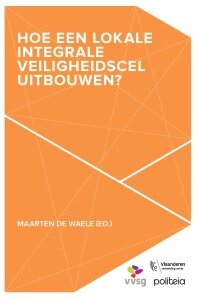Project design
The EMMA project involves a comprehensive evaluation with the aim to realise a realistic process evaluation based on two central pillars: an academic evaluation and a practical based mentoring trajectory to combine scientific evidence and practical knowhow. The project fills in the urgent need to develop practice-oriented evaluation tools for MAWs in the EU and specifically in three participating countries, i.e. Belgium, the Netherlands and Germany. with this project, we answer questions such as:
- How can a local coordinator improve multi-agency functioning?
- How can the participants of multi-agency structures critically monitor and evaluate their own functioning?
- How to ensure that your multi-agency network is sustainable, without becoming too formalised?
- How to deal with differences in opinions and roles within multi-agency work?
- How to organise the follow-up of cases effectively and efficiently?
- How can we shape and support multi-agency work in the future?
The project itself was launched on February 1st 2020 under coordination of the Association of Flemish Cities and Municipalities (VVSG) and in collaboration with Ghent University, RadarAdvies and the Violence Prevention Network (VPN).

Results and output
E-publication
As a final product of the European EMMA project, the e-book "Evaluation and mentoring of the multi-agency approach to violent radicalisation" was published. In this book you will find an overview of both academic and practice-based actions resulting from the project. The publication can be downloaded here.
Review our closing conference
At March 31, 2022 the EMMA consortium presented the results and output from two years of work with cities and municipalities in Germany, Belgium, and the Netherlands. The event itself was organised hybridly, allowing us to offer you the recordings. In addition, you can also find here the powerpoint presentation that was used during the event.
On the right you can see another photo of (some of) the participants in the EMMA project. This is a composition of members of our EMMA steering committee, members of the national EMMA peer-to-peer assessment networks and employees of the three mentoring organisations (VVSG, VPN and RadarAdvies) and the academic partner (Ghent University). Thanks to them, we were able to achieve a good result in the difficult COVID-19 circumstances.

Scientific process evaluation
The academic partner of the EMMA project, Ghent University conducted a process-evaluation of the MAW approach in the three countries, under coordination of Ghent University. This evaluation is based on the method of realistic evaluation. Realistic evaluation not only addresses the question whether something works, it is primarily interested in “how” something might work. By understanding how MAW try to achieve their objectives and which processes are set in motion, we can explore what works, if it is promising and under what conditions it works. In this way, we can make constructive recommendations for MAW in the context of radicalisation and violent extremism. The research consisted out of the following actions:
- Systematic literature review on process indicators for MAW
- Participatory observations during MAW meetings,
- Qualitative semi- structured interviews with MAW participants
- Focus groups to deepen missing elements
On the basis of the scientific research carried out, Ghent University has developed a practice-oriented self-evaluation tool with indicators and guidelines for local officials (participants of MAW). This self-evaluation tool allows cities to evaluate their own MAW approach.
The self-evaluation tool is available on the EMMASCAN website. The tool consists of 7 modules and results in a report with several recommendations for the local approach. Several versions of this tool are available. Separate versions are provided for the participating countries. As a result, you can choose for a separate Belgian (Dutch-België/French-Belgique), Dutch or German version of the tool. But even if you are not based in one of the participating countries, you can still complete the tool. A additional and neutral English version was added into the system, so anyone can make use of the tool when evaluating their multi-agency work in tackling violent radicalisation

Peer-to-peer mentoring trajectory
The practical based mentoring trajectory has been developped to strengthen the position and enhance professionals’ ability of MAW officials. This trajectory focusses on guidance by individual and peer consultancy. On the individual level, the three mentoring organisations (VVSG, VPN and RadarAdvies) entangled the local strengths and weaknesses in a one-on-one situation with the MAW coordinator. The peer consultancy worked on critically (written and oral) reviewing MAW of peers, making revision exercises and setting targets to tackle shortcomings. In every country the mentoring organisations selected 6 MAW officials by which the following actions were carried out:
- The mentoring organisations conducted intake interview with the MAW coordinator
- Four national peer-to-peer assessment meetings were organised in every country (Belgium, the Netherlands and Germany)
- Before every national peer-to-peer assessment meeting the MAW coordinators carried out a preparatory task
- Five online international meetings were held for cross border exchange of expertise
Part of the outcome of the mentoring process are five topical papers on crucial elements of multi-agency functioning. The papers can be viewed below. Each paper focuses on a concrete issue and formulates tips and recommendations on how to deal with these issues in practice:
- Evaluating multi-agency networks in the field of P/CVE
- Sustainable P/CVE approaches: The importance of continuation and formalisation for multi-agency-networks
- Flexibility of MAW approaches towards new emerging challenges
- Hierarchy and cooperation within multi-agency networks in the field of P/CVE
- Casemanagement and information sharing within multi-agency networks in the field of P/CVE
Four participants from our EMMA peer-to-peer network in Belgium, Germany and the Netherlands were asked about their experiences in the mentoring process. Here are their lessons learned and their story about why mentoring your multi-agency approach may be of interest to you as well
If you want more information please contact our coordinator Katrien Van Mele






